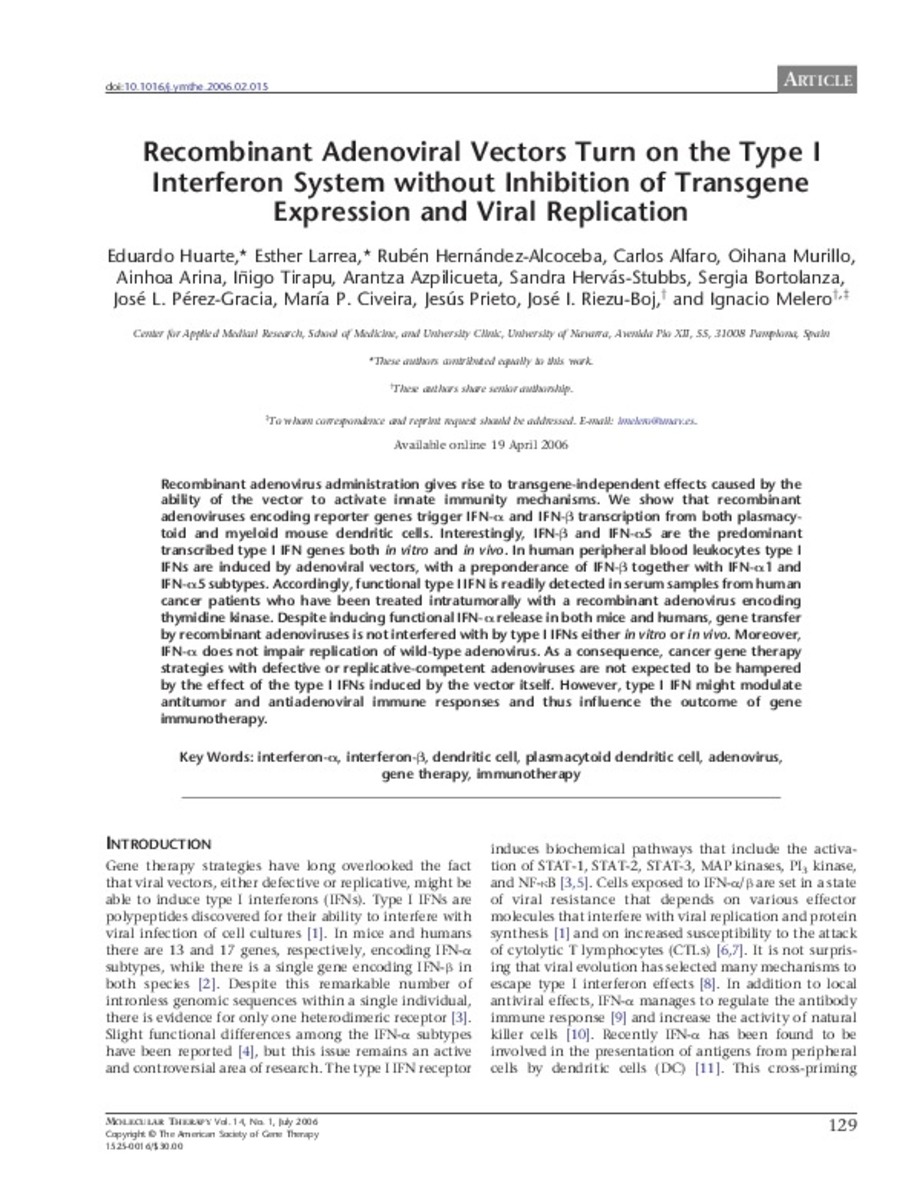Full metadata record
| DC Field | Value | Language |
|---|---|---|
| dc.creator | Huarte, E. (Eduardo) | - |
| dc.creator | Larrea, E. (Esther) | - |
| dc.creator | Hernandez-Alcoceba, R. (Rubén) | - |
| dc.creator | Alfaro, C. (Carlos) | - |
| dc.creator | Murillo, O. (Oihana) | - |
| dc.creator | Arina, A. (Ainhoa) | - |
| dc.creator | Tirapu, I. (Íñigo) | - |
| dc.creator | Azpilicueta, A. (Arantza) | - |
| dc.creator | Hervas-Stubbs, S. (Sandra) | - |
| dc.creator | Bortolanza, S. (Sergia) | - |
| dc.creator | Perez-Gracia, J.L. (Jose Luis) | - |
| dc.creator | Civeira, M.P. (María Pilar) | - |
| dc.creator | Prieto, J. (Jesús) | - |
| dc.creator | Riezu-Boj, J.I. (José Ignacio) | - |
| dc.creator | Melero, I. (Ignacio) | - |
| dc.date.accessioned | 2012-01-15T14:58:18Z | - |
| dc.date.available | 2012-01-15T14:58:18Z | - |
| dc.date.issued | 2006 | - |
| dc.identifier.citation | Huarte E, Larrea E, Hernandez-Alcoceba R, Alfaro C, Murillo O, Arina A, et al. Recombinant adenoviral vectors turn on the type I interferon system without inhibition of transgene expression and viral replication. Mol Ther 2006 Jul;14(1):129-138. | es_ES |
| dc.identifier.issn | 1525-0024 | - |
| dc.identifier.uri | https://hdl.handle.net/10171/20417 | - |
| dc.description.abstract | Recombinant adenovirus administration gives rise to transgene-independent effects caused by the ability of the vector to activate innate immunity mechanisms. We show that recombinant adenoviruses encoding reporter genes trigger IFN-alpha and IFN-beta transcription from both plasmacytoid and myeloid mouse dendritic cells. Interestingly, IFN-beta and IFN-alpha5 are the predominant transcribed type I IFN genes both in vitro and in vivo. In human peripheral blood leukocytes type I IFNs are induced by adenoviral vectors, with a preponderance of IFN-beta together with IFN-alpha1 and IFN-alpha5 subtypes. Accordingly, functional type I IFN is readily detected in serum samples from human cancer patients who have been treated intratumorally with a recombinant adenovirus encoding thymidine kinase. Despite inducing functional IFN-alpha release in both mice and humans, gene transfer by recombinant adenoviruses is not interfered with by type I IFNs either in vitro or in vivo. Moreover, IFN-alpha does not impair replication of wild-type adenovirus. As a consequence, cancer gene therapy strategies with defective or replicative-competent adenoviruses are not expected to be hampered by the effect of the type I IFNs induced by the vector itself. However, type I IFN might modulate antitumor and antiadenoviral immune responses and thus influence the outcome of gene immunotherapy. | es_ES |
| dc.language.iso | eng | es_ES |
| dc.publisher | Nature Publishing Group | es_ES |
| dc.rights | info:eu-repo/semantics/openAccess | es_ES |
| dc.subject | Interferon-alpha | es_ES |
| dc.subject | Interferon-beta | es_ES |
| dc.subject | Dendritic cell | es_ES |
| dc.subject | Plasmacytoid dendritic cell | es_ES |
| dc.subject | Adenovirus | es_ES |
| dc.subject | Gene therapy | es_ES |
| dc.subject | Immunotherapy | es_ES |
| dc.title | Recombinant adenoviral vectors turn on the type I interferon system without inhibition of transgene expression and viral replication | es_ES |
| dc.type | info:eu-repo/semantics/article | es_ES |
| dc.relation.publisherversion | http://www.nature.com/mt/journal/v14/n1/full/mt20061275a.html | es_ES |
| dc.type.driver | info:eu-repo/semantics/article | es_ES |
Files in This Item:
Statistics and impact
Items in Dadun are protected by copyright, with all rights reserved, unless otherwise indicated.






